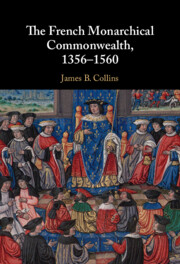Book contents
- The French Monarchical Commonwealth, 1356–1560
- The French Monarchical Commonwealth, 1356–1560
- Copyright page
- Contents
- Illustrations
- Preface
- Introduction
- 1 La chose publique de nostre royaume
- 2 Political Vocabulary in Action
- 3 Murder, Justice, and la chose publique in an Age of Madness
- 4 The Commonwealth under Siege
- 5 The chose publique and Urban Government
- 6 The Orléanist Offensive
- Conclusion
- Bibliography
- Index
Conclusion
Published online by Cambridge University Press: 05 May 2022
- The French Monarchical Commonwealth, 1356–1560
- The French Monarchical Commonwealth, 1356–1560
- Copyright page
- Contents
- Illustrations
- Preface
- Introduction
- 1 La chose publique de nostre royaume
- 2 Political Vocabulary in Action
- 3 Murder, Justice, and la chose publique in an Age of Madness
- 4 The Commonwealth under Siege
- 5 The chose publique and Urban Government
- 6 The Orléanist Offensive
- Conclusion
- Bibliography
- Index
Summary
The demons loosed in 1559–1561 transformed the French monarchy and hastened the arrival of a new rhetoric of politics, soon to be built around “the State” [l’Estat]. Practical political crises, such as the capture of John II, had often accelerated rapid changes in practice, theory, and justification, and I would argue did so precisely in that order. John’s capture led to the most fundamental change in the history of the French monarchy – permanent taxation – and, under his son Charles V, to a new monarchical discourse seeking to legitimize it. Permanent taxation required both a theoretical foundation and a public justification: that Charles V’s subjects rankled at this innovation is obvious from the events of 1380–1382. Charles V’s new discourse emphasized the “chose publique” of the kingdom of France; the “bien de la chose publique” lasted for nearly two centuries as the monarchy’s key justificatory phrase. After rampant rhetorical confusion between the 1560s and the 1590s, the neologism “bien de l’Estat” permanently took its place, as French (and other) monarchs sought to convince their subjects that the State was the new form of the res publica.
Keywords
- Type
- Chapter
- Information
- The French Monarchical Commonwealth, 1356–1560 , pp. 265 - 276Publisher: Cambridge University PressPrint publication year: 2022

